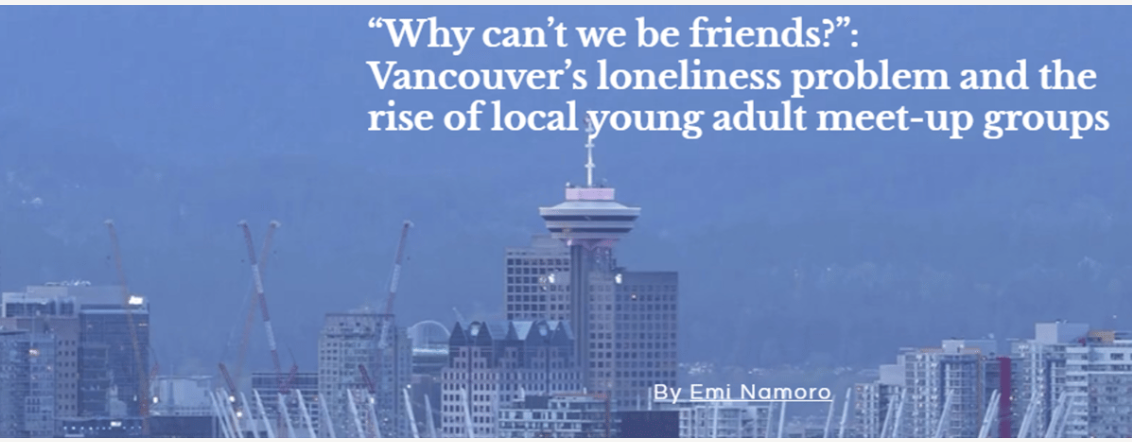VANCOUVER (CCN) — It all started with a cup of coffee and a dream. When communications student Emi Namoro and her friend Maggie decided to host a women’s ministry meet-up in New Westminster, they weren’t sure anyone would show up. The group, playfully named “The Immaculatte,” was their experiment in breaking through Vancouver’s thick fog of social isolation.
“I wasn’t expecting to spend my Saturday morning waiting for possible strangers to arrive at a rainy café,” Namoro recalls in her digital storytelling project, The Vancouver Loneliness Project. “Our first meeting had only one participant. I was nervous that no one would come at all.”
Her co-founder reassured her that even if it was just the two of them, they would “catch up and call it a day.” Then, as Namoro writes, “the door opened and a couple girls started walking in our direction.” That simple moment, strangers choosing to walk toward connection, became the spark for a much larger reflection on loneliness in Vancouver.

Whether born here or newly arrived, many young adults in Vancouver know the ache of social isolation. “It became so hard to make and keep friends as a young adult,” Namoro writes. “Work friends stayed at the office. School friends stayed on campus.”
A Vancouver Foundation report cited in her project found that adults aged 25 to 35 are the group most affected by loneliness in Metro Vancouver.

Her research also uncovered a local term that captures the city’s social chill: “B.C. bail.” As Namoro explains in her piece, “‘B.C. bail’ is when someone cancels a plan last minute due to the weather or after a better invitation or event comes along. “It’s so fascinating that Vancouverites have the reputation of being flakey and yet so many people in the city are feeling social isolation,” she notes.
The mix of politeness, rain, and reluctance, Namoro writes, can leave many people feeling alone in a crowd.
“I created this project for one of my communications classes at Simon Fraser University,” she said. “We were asked to tell a digital story about an issue that mattered to us, something rooted in our own community.”

“I actually wanted to write about the return of long-form content online,” she said. “But my TA challenged us with this question, ‘Is there really nothing of significance in our own communities that is worthy of study?’ That question resonated with me.”
“I’ve felt deep social isolation living in Vancouver, especially in my early 20s and during the pandemic,” she said. “I wanted to see if I was alone in feeling this way, if others felt the same way, and if there was something we could do about it.”
Namoro discovered the issue had been discussed for years; even CBC had a series called Pretty Lonely. “At the same time, there were also recent articles about the rise of local meet-up groups, so it felt like an antidote to a years-long issue,” she said.
After launching the project and interviewing friends about their experiences, “I realized that many of us were living the same lives,” she said. “We all felt friendship fallouts of early adulthood and the hard transition of finding our community. It turned out that I wasn’t alone in feeling lonely, and realizing that other people were doing something to remedy this issue (meet-up groups) gave me hope.”

“I also reflected on my own experience leading a Catholic meet-up group and how it led me to meeting some of my friends today,” she added. “Despite the weather and all the barriers that keep us from making connections, it’s up to us whether we want to make that effort to make friends. Loneliness isn’t forever. It can feel inevitable as we grow into who we are. I believe that if we get outside of our comfort zones and put in an effort to meet people, we’ll find our people eventually. We need each other.”
Vancouver’s economics don’t make it easier. Her project cites reporting on how the city has the highest housing costs and household debt in Canada.
“People are living paycheque to paycheque,” says Esme, one of Namoro’s interviewees. “We’re already exhausted from that, and then having to put in the effort to make a new friend — it’s at the bottom of the list.”
Angelo, who moved to Vancouver four years ago, admits, “I remember being rather lonely for the first three to four months living in Vancouver.”
Former participant Rachel told Namoro that what first drew her in was “a personal invitation” and the chance “to connect with other like-minded women.” She said the discussions, especially about faith, “help us realize we’re not alone in our struggles.”

Rachel also sees value in the meet-up model itself: “The nice thing about meet-up groups is that you know everyone is going with the same intention.” She’s noticed more such groups emerging around Vancouver, such as “boss-women coffee walks,” “meet your dog” socials, and small dinner circles — signs, she believes, that people are still looking for community.
Alyssa, another interviewee, described how hard it became to maintain deep friendships through university and then through COVID. “When the pandemic came on it was 10 times, 20 times harder to find that group of friends,” she said. Joining the book club gave her exactly what she needed: “In a very lonely time, that was exactly what I was looking for — people to have good conversations with and get to know.”
In the end, Namoro and Maggie decided to build community themselves rather than give up. Their monthly meet-up group for women offered “coffee, conversation and ice cream” as a low-pressure way to meet new people.
“The best part of hosting a meet-up group is, well, the people themselves,” Namoro reflects. “Despite my initial fear and hesitation, I don’t ever regret putting myself out there and helping others, just like me, find community.”
The gatherings ended during the pandemic, but the friendships continued through a women’s book club that grew from the same network.
Namoro’s project cites experts who warn that chronic loneliness is a serious health issue. The Canadian Mental Health Association reports that social isolation can shorten lifespan as much as smoking 15 cigarettes a day.
UBC philosopher Kimberley Brownlee adds: “When we don’t exercise our social skills, our attitude about social connection changes. We can start to see it as threatening rather than comforting. We need each other. We are social to our core.”

Namoro doesn’t claim that meet-ups will solve Vancouver’s loneliness problem. “They’re not the one and only way,” she writes, “but they prove that people are trying to make an effort to bridge the problem.”
Her advice for the lonely: “Go outside your comfort zone and give yourself grace.”
Making friends isn’t easy, especially in a lonely city like Vancouver,” she admits. “But there are many people out there who are looking for a friend like you. Take a chance and say hello.”
Emi Namoro is digital community coordinator for the Archdiocese of Vancouver’s Communications Office.




